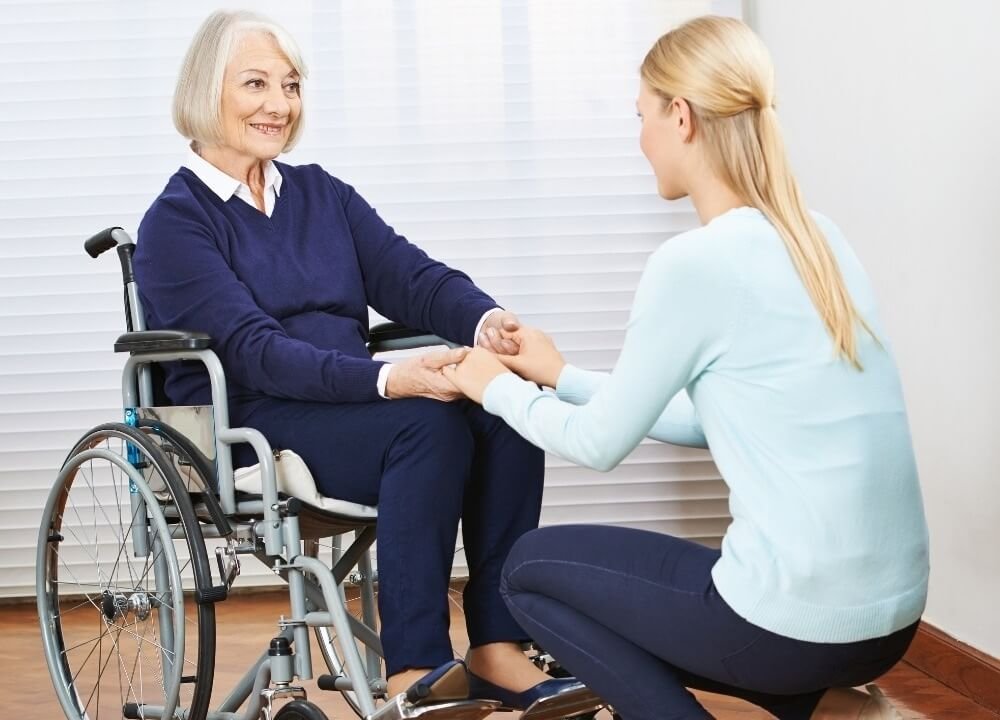After getting a positive dementia diagnosis, you may be wondering how does dementia affect you physically.
Dementia is a general term that describes the severe loss of memory and other mental abilities that can affect a person’s day to day life.
While the illness is mostly associated with memory and mental issues, the symptoms can physical as well.
Contents
How Can Dementia Affect you Physically?
Below we will discuss the physical symptoms of dementia. Research indicates that the disease usually has a significant impact on a person’s physical health in the later stages of the illness.
Let’s further research some of the most common physical challenges that people with dementia may face.
Immobility

One of the ways that dementia will affect you physically is through the gradual loss of the ability to stand, walk, or get up from your bed or chair.
It normally starts with slowed movement because of reduced muscle control.
This can make injuries due to falls more frequent because they are mostly caused by problems with coordination and balance.
You may also find yourself sitting in one position for extended periods with limited movement.
It implies that you may be at the risk of developing bedsores (pressure ulcers).
The problems can be caused by dementia, the medication you are taking, balance problems, other medication conditions like stroke, and the environment.
At times, you can suffer from involuntary jerking movements of the body, arms, or legs. This usually constitutes a single movement, hence, cannot be categorized as fits.
Try and move around more
As your mobility decreases, the risk of getting blood clots and infection increases. It is, therefore, important to try and move around as much as possible.
This can be done through chair-based exercises or caregivers can offer you the support you need to walk around.
Working with a professional physiotherapist or occupational therapist can help increase your mobility while minimizing chances of injury.
Home renovations are also helpful when it comes to creating a safe environment where you can move about with ease without risks of tripping and falling.
Problems with Swallowing

Difficulties with chewing and swallowing are common for persons who have dementia.
Moreover, dysphagia is a medical term that refers to problems with swallowing.
This is caused by multiple factors including damage to the sections of the brain that are responsible for controlling swallowing.
At some point, you may forget how to chew or even hold food in your mouth.
Other drinking and eating problems you may experience include:
- Leaving most of your food
- Repeatedly chewing without swallowing or challenges when chewing specific foods
- Overfilling the mouth
- Eating quickly
- Believing that your food has been poisoned
- Getting tired of eating hence giving up
- Not recognizing that food is something that needs to be eaten
- Spitting out food or lumps
- Coughing when eating or drinking
- Having a hard time swallowing tablets
- Pocketing food in cheeks
- Drooling saliva, fluid, or even food
This is dangerous because it increases the risk of inhaling food or choking.
Feeding yourself also becomes difficult because the brain forgets how to make muscles work properly.
It can lead to a loss of appetite where you do not feel like drinking or eating anything.
Consequently, you may end up losing weight and suffering from dehydration and malnutrition.
To ensure your nutrition is well taken care of, food can be cut into manageable sizes or even pureed.
It is also important to maintain good oral hygiene to avoid gum disease.
When you are feeling pain in your mouth, chewing can be difficult and uncomfortable.
If you have dentures, they should be properly fitted. Working with a speech and language therapist can help you deal with swallowing issues.
Vision Changes

Dementia can affect how your eyes see making it another way dementia affects you physically.
Your field of vision may narrow down to about 12 inches when you have the disease.
Experts compare this to wearing binoculars which can be a difficult change to deal with. As the illness progresses, you can end up seeing with only one eye.
This indicates that you will lose depth perception; thus, not be able to tell if something is 2 or 3 dimensional.
This mostly happens when the brain finds that information coming from both eyes is too overwhelming.
You may also start to experience blurring where you see images less sharply.
Common objects and faces become more challenging to recognize. This can make it hard to find objects and it can also affect your ability to write and read.
It is also possible that your pupils may start reacting a bit slower to light.
This will make it difficult for you to move from a light to a dark space.
It may be overwhelming to stay outside on a sunny day because the light will appear too bright until your pupils react.
Loss of peripheral vision
Individuals with dementia may also experience loss of peripheral vision. It is where you will not be able to see things objects that are directly in front of you.
Generally, you will be seeing things out of the corner of your eye.
This means that you may not be able to see objects around you which can lead to increased tripping over chairs, bumping into door frames, and falls.
With the loss of peripheral vision, you may not be able to see someone if they come up to you from the side or behind.
Carers need to understand that dementia can cause a variety of vision problems.
They can assist you by standing in front of you when communicating. The use of contrasting colors and large pictures can help you see and find common things.
Giving you enough time to adjust to different light levels can be helpful when your pupils are slowly reacting to light.
Incontinence

Having problems using the toilet is yet another way dementia affects you physically.
There are 2 types of incontinence that you can suffer from. One is urinary incontinence where you may experience a small leak of trickling after passing urine.
After a while, you may no longer have control of your bladder.
While there are different types of urinary incontinence the most common is where you will feel an intense and sudden need to go as well as frequent urination.
Fecal incontinence is the 2nd type of incontinence which is not too common.
It can range from passing small amounts of feces when you are breaking wind or having no control over your bowels at all.
This may happen because messages between the bowel or bladder and the brain are distorted.
As a result, you may not recognize when you have a full bladder or bowel or even have the control you need to empty them.
Incontinence normally develops in the last dementia stages.
It can be a challenging time for you as well as the people looking after you.
To manage incontinence, you can talk to your doctor to get medication that can help calm an overactive bladder.
Managing incontinence in dementia
Caregivers can also offer support to you in several ways like:
- Ensuring your diet has enough fiber to help avoid constipation
- Making sure you avoid acidic or spicy foods that irritate the urinary tract
- Limiting the liquids you take before bed
- Avoid caffeine or carbonation
- Regular appropriate exercises
- Taking enough fluids to keep the bladder and bowel healthy
- Ensuring you have absorbent products like adult liners or pads where necessary
- Closing Remarks
Final words
The physical symptoms you may have for dementia may not be similar for everyone with the illness. Knowing what to expect in terms of how dementia will affect you physically is crucial to help you get in the right frame of mind to tackle the issues ahead.
It also allows you to get the support you need to enjoy a quality life even with the challenges that come with the disease.







